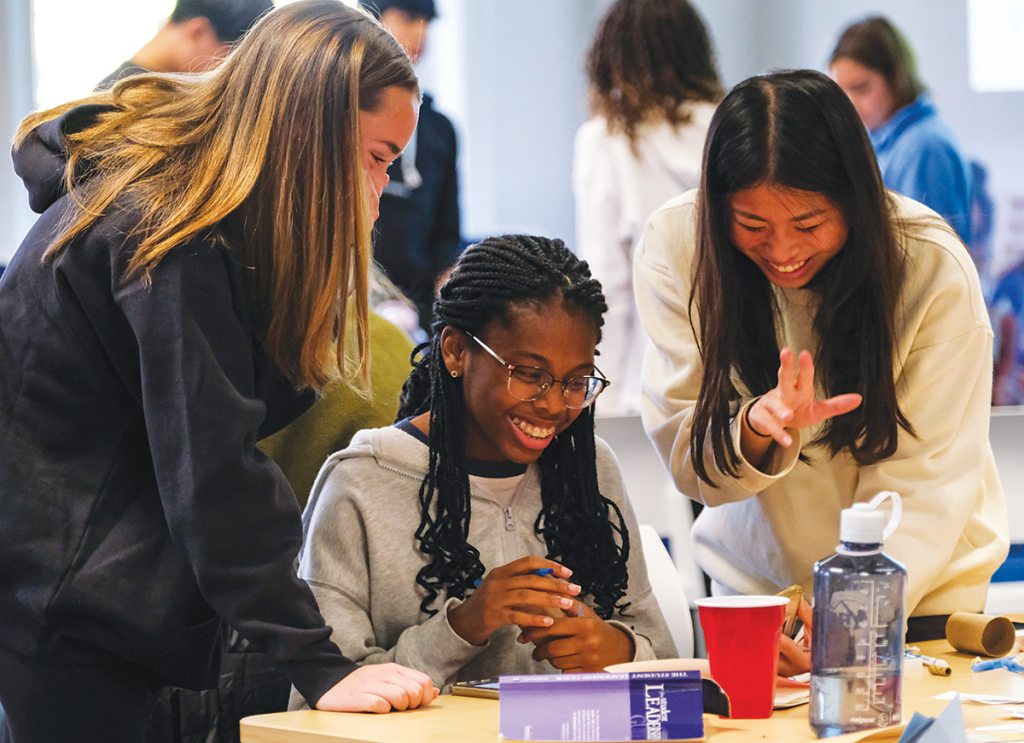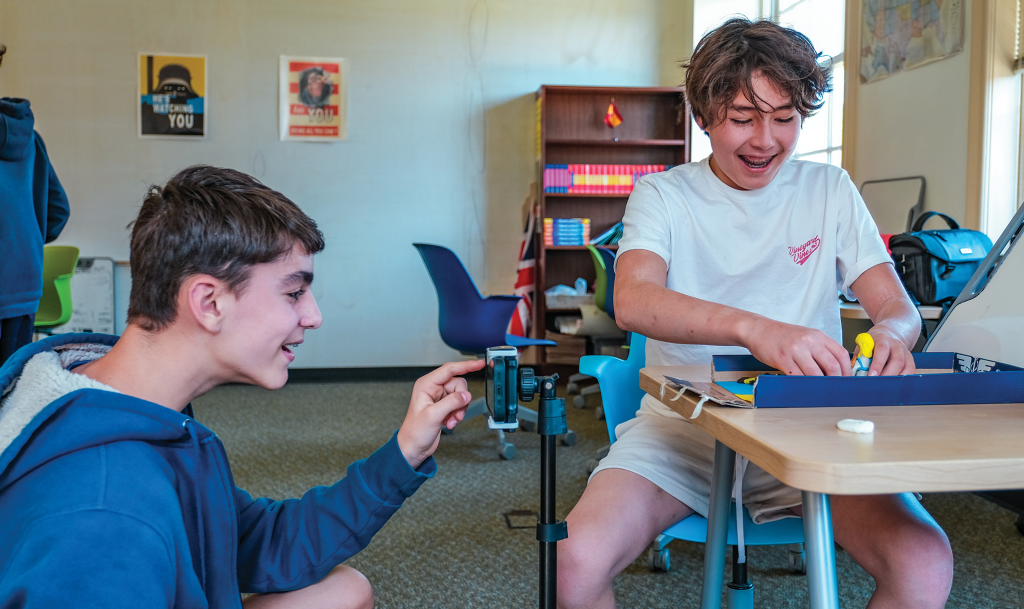College and career readiness have long been the cornerstone goals of independent schools, with rigorous academics taking center stage.
Indeed, CA is renowned for its exceptional academics and student outcomes. By many polls and metrics, we are topping the charts and living our mission of academic excellence. Our students represent us at internships in ways that wow their employers. They travel and speak languages with near fluency and go off to a breathtaking variety of right-fit colleges the world over, prepared and confident for what lies ahead.
However, as is our way, CA is thinking bigger and bolder. As a learning community, we’re reimagining conventional notions of academic rigor and excellence—too often measured by the number of hours spent hunched over textbooks or the weight of a backpack burdened with overloaded classes. Instead, we are focusing on what our students need, not only for collegiate and professional success, but also for leading meaningful and fulfilling lives.
Call it life readiness; enter purpose-driven academics.
ON PURPOSE
Defined by William Damon, Professor of Education and Director of Stanford University’s Center on Adolescence, as “a stable and generalized intention to accomplish something that is at the same time meaningful to the self and consequential for the world,” a sense of purpose is crucial for healthy development and lifelong fulfillment. Research shows that it boosts motivation, resilience, and overall mental and physical wellbeing. No matter how lofty (reversing climate change) or down to earth (being a good friend and helping others), a defined sense of purpose offers a psychological anchor during life’s challenges and can even protect against chronic diseases.
Educational experts and psychologists highlight studies showing that teens and young adults with a clear sense of purpose are more engaged in academics, exhibit greater perseverance, and report higher life satisfaction and happiness. They are more likely to feel socially responsible, engage in ethical behaviors, and make positive contributions to their communities.
By integrating a quest for purpose into students’ academic journeys, CA aims to create a more holistic and meaningful educational experience, one that prioritizes both inward self-discovery and outward exploration, safeguards against stress and burnout, inspires a lifelong love of learning to yield not only exceptional scholars, but also fulfilled human beings and engaged global citizens.
“Purpose-driven education prepares students for more than just academic success. It prepares them for life and the needs of today’s ever-changing world,” explains Head of the School, Dr. Mike Ehrhardt. “When learning aligns with purpose, students develop a strong sense of identity, a commitment to contributing to society, and the skills to navigate complex life challenges. They learn to set meaningful goals, find joy in their pursuits, and make a positive impact on the world around them.”
FINDING YOUR WHY
Just how does CA help students achieve the profound goal of connecting with their unique sense of purpose? Put simply, by giving students diverse and immersive opportunities to think, feel, and do. It’s a forward, future-thinking approach.
“Learning in the past emphasized thinking, or helping students memorize content and develop key cognitive skills. Learning in the future will integrate thinking with rich forms of feeling and doing, all at the same time. At the center of these three domains, students have a chance to explore purpose in learning and life.” (NAIS, On Purpose).
Empowering students to “own their learning” in the classroom and through diverse experiential and extracurricular opportunities, we help them explore what interests them and discover what doesn’t. We encourage them to take risks, fail, and get back up again. We broaden visions of success by encouraging students to follow not a prescribed path but the right path for them—one that matches their values, strengths, and visions for their future.
In all we do, there are opportunities for self-reflection, opportunities for students to consider (and re-consider and re-evaluate) the personal “whys” and “to what ends” that drive their goals—to consider who they want to be, the kind of world they want to live in, and how they will contribute to building it.
Our alums tell us this approach yields positive results. In a recent alumni survey, 87% of respondents reported high satisfaction with their life post-college and credit CA with helping them find their passion for learning.
WIN-WIN-WIN
“Too often there is a sense that experiential learning opportunities or social-emotional learning opportunities are at the expense of the so-called “real” learning of traditional classroom academics. And that’s a misconception; it isn’t a zero-sum game,”shares Ehrhardt.
“When those three come together synergistically and thoughtfully, it’s a win-win-win. That’s where we see the most powerful learning outcomes—where students find true academic success precisely because they’ve had the space to explore their passions and identity, engage with diverse perspectives, and confront real-world challenges.
At the heart of this approach is a fundamental paradigm shift. One that requires students to think beyond an instrumental view of learning—of rote academic box-checking as merely a means to the next milestone—to something far more meaningful and sustaining.
It’s a welcome change that resonates with Dr. Gary Bennett, Dean of Trinity College of Arts and Sciences at Duke University. Responsible for ensuring a world-class liberal arts education in a research environment for thousands of students, Dr. Bennett sees first-hand how an instrumental view of learning can be detrimental to students.
“So many of our students are motivated to excel in the classroom and to collect all of the experiences they believe will ensure their professional success. However, this kind of approach—where students try to check all the boxes—can often be a way to miss what’s most impactful about the college experience. We want our students to more frequently take time to reflect, to ask, Who am I? What have I learned? How have I changed? How is this going to order my steps for what I want to do next? These are critically important parts of the learning process,” shares Bennett, who recently spoke to Cary Academy parents during a PTAA session on experiential learning.
“We want students to try new things and explore new opportunities. We want them to be resilient in the face of failure. We want students to learn what animates them and what they should avoid trying again.”
By disrupting an instrumental approach to learning and starting students on the purpose-driven path now, CA helps students build the muscles they need, not only to make the most of their college experiences, but of their lives.


